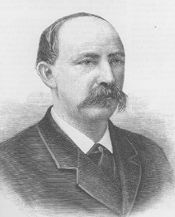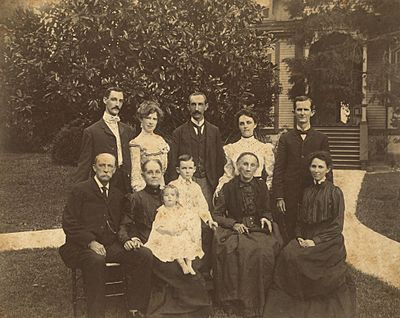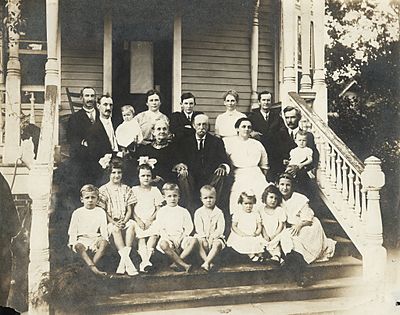Samuel Dibble facts for kids
Quick facts for kids
Samuel Dibble
|
|
|---|---|
 |
|
| Member of the U.S. House of Representatives from South Carolina's 1st district |
|
| In office March 4, 1883 – March 3, 1891 |
|
| Preceded by | John S. Richardson |
| Succeeded by | William H. Brawley |
| Member of the U.S. House of Representatives from South Carolina's 2nd district |
|
| In office June 9, 1881 – May 31, 1882 |
|
| Preceded by | Michael P. O'Connor |
| Succeeded by | Edmund W.M. Mackey |
| Member of the South Carolina House of Representatives from Orangeburg County | |
| In office June 1, 1877 – March 22, 1878 |
|
| Preceded by | Daniel Augustus Straker |
| Succeeded by | Multi-member district |
| Personal details | |
| Born | September 16, 1837 Charleston, South Carolina |
| Died | September 16, 1913 (aged 76) Baltimore, Maryland |
| Resting place | Orangeburg, South Carolina |
| Political party | Democratic |
| Spouse |
Mary Christiana Louis
(m. 1864) |
| Children | Frances Agnes Dibble (b. 1866) Samuel Dibble II (b. 1868) Louis Virgil Dibble (b. 1873) Mary Henley Dibble (b. 1874) |
| Alma mater | Wofford College |
| Profession | lawyer, politician |
Samuel Dibble (September 16, 1837 – September 16, 1913) was an important figure in South Carolina history. He was a lawyer, a teacher, and served as a U.S. Representative for his state. He also fought in the Civil War.
Contents
Early Life and Family History
Samuel Dibble was born in Charleston, South Carolina, on September 16, 1837. He was the oldest son of Philander Virgil and Frances Ann (Evans) Dibble. His father and uncle moved from Bethel, Connecticut, to Charleston, where they worked together making hats.
Samuel's mother, Ann Evans, came from families with interesting backgrounds. Her ancestors included French Huguenots, who were French Protestants, and the Henley family from England. The Dibble family also had deep roots in America, tracing back to Thomas Dibble. He came from England to Dorchester, Massachusetts, in 1630 as part of the Puritan migration to New England (1620–1640). These Puritans were people seeking religious freedom. In 1635, Thomas Dibble helped found Windsor, Connecticut.
Young Samuel studied in both Bethel, Connecticut, and Charleston, South Carolina, as he grew up.
College and Becoming a Lawyer
In 1853, Samuel Dibble started college at the College of Charleston. After two years, he moved to Wofford College in Spartanburg, South Carolina. He graduated in July 1856, becoming the very first graduate of Wofford College! Later, Wofford College honored him with a special law degree.
After college, Samuel worked as a teacher in Orangeburg District from 1856 to 1857. He also taught at Wofford College for a short time in 1858. During these years, he studied law. He learned how to be a lawyer and was officially allowed to practice law in December 1859. In January 1860, he opened his own law office in Orangeburg, South Carolina. He also helped edit a local newspaper called the Orangeburg News.
Military Service in the Civil War
Samuel Dibble served as a soldier throughout the American Civil War. This war was fought in the United States from 1861 to 1865. On January 3, 1861, he joined the Edisto Rifles as a private, which is the lowest rank for a soldier. He later became a first lieutenant. His company was part of the Twenty-Fifth South Carolina Volunteers. He also served under famous Confederate general Wade Hampton III.
A Career in Politics
After the Civil War, Samuel Dibble returned to practicing law in Orangeburg. He also started his career in politics.
He served as a member of the South Carolina House of Representatives in 1877 and 1878. This is part of the state government that makes laws for South Carolina. He was also a trustee for the University of South Carolina in 1878, helping to guide the university. He served on the Board of School Commissioners for Orangeburg County, helping to oversee local schools.
In 1880, he was chosen as a delegate to the Democratic National Convention. This is a big meeting where the Democratic Party chooses its candidate for president.
Samuel Dibble also served in the United States House of Representatives. This is part of the U.S. Congress, where laws are made for the entire country. He was first elected to fill a vacancy and served from June 9, 1881, to May 31, 1882. However, there was a dispute about who truly won that election, and the seat was later given to someone else.
Despite this, Dibble was elected to the U.S. House of Representatives again in 1883. He served for four terms, from March 4, 1883, to March 3, 1891. During his time in Congress, he was the chairman of the Committee on Public Buildings and Grounds. This committee was in charge of government buildings and land. He decided not to run for reelection in 1890.
Later Life and Legacy
After his time in Congress, Samuel Dibble worked in banking and other businesses in Orangeburg, South Carolina. He passed away near Baltimore, Maryland, on September 16, 1913, which was his 76th birthday. He was buried in Sunny Side Cemetery in Orangeburg, South Carolina.
 | Janet Taylor Pickett |
 | Synthia Saint James |
 | Howardena Pindell |
 | Faith Ringgold |



